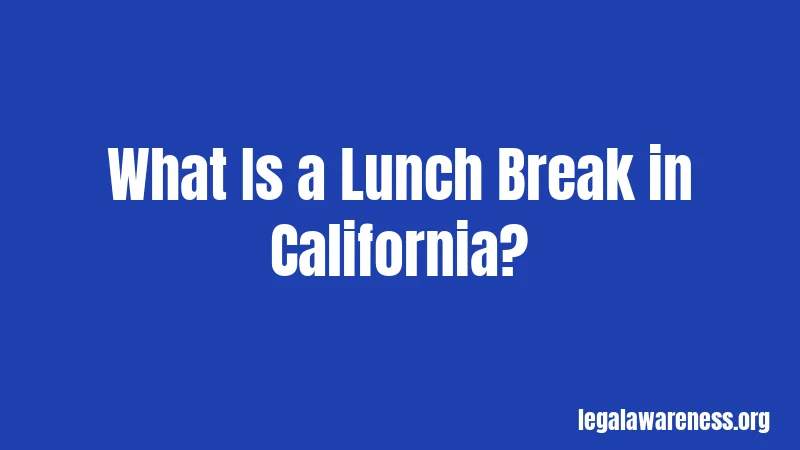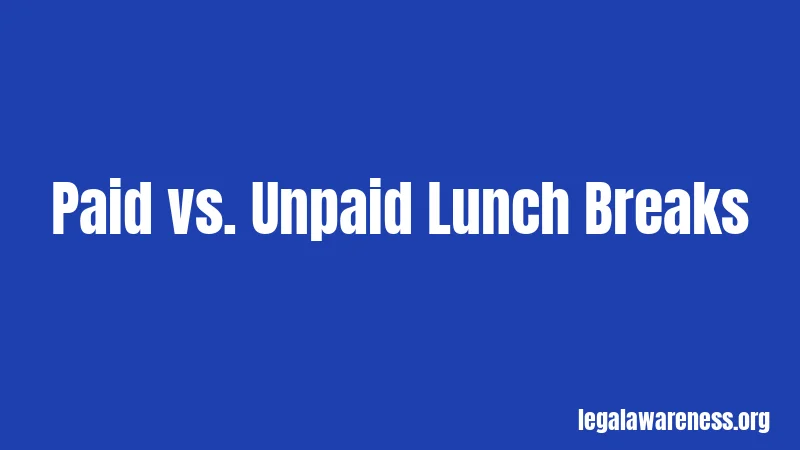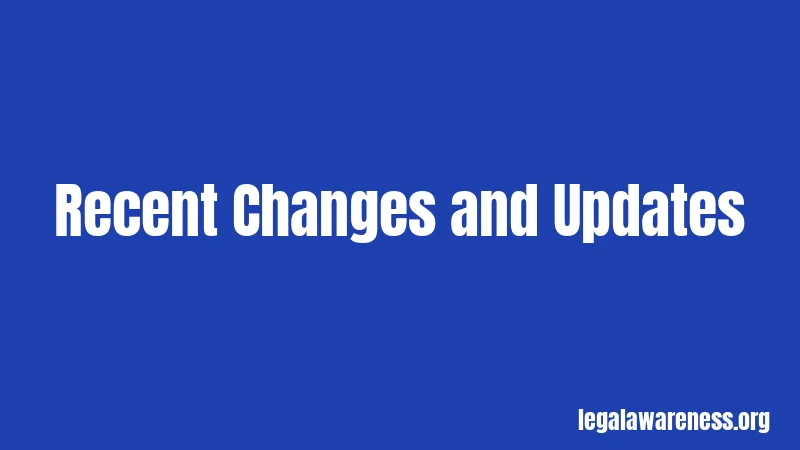California Lunch Break Laws (2026): Your Workplace Rights Explained
Most workers have no idea what rights they actually have during their lunch break. Here’s the thing: in California, lunch break laws are pretty specific. Your employer can’t just skip giving you a break whenever they feel like it. These rules protect millions of Californians, but honestly, a lot of people don’t know the details.
So what happens if your boss breaks these rules? You could end up with extra pay. You might even have a case for a lawsuit. This guide breaks down exactly what California requires, what your rights are, and what to do if something doesn’t seem right.
What Is a Lunch Break in California?

Okay, let’s start simple. A lunch break is a meal period during your workday. Think of it as protected time away from work where you’re free to do your own thing. In California, these aren’t just nice perks—they’re legally required.
California has strict laws about when and how long lunch breaks need to be. These laws apply to almost all workers in the state. The main rule? Your employer must give you an uninterrupted break. That means you can’t be “on call” or expected to work while eating.
Basic Lunch Break Requirements
The 30-Minute Rule
Here’s where it gets interesting. If you work more than 5 hours in a day, your employer must give you at least a 30-minute lunch break. That sounds straightforward, right?
But there’s a catch. That break needs to happen before you’ve worked more than 5 hours. So if you start at 9 a.m., your lunch break should happen before 2 p.m. Your employer can’t make you wait until 4 p.m. and then give you 30 minutes off.
During your lunch break, you’re completely off the clock. Your employer can’t ask you to work, answer emails, or be available. That time belongs to you.
When Breaks Can Be Skipped
Now, here’s where things get a little tricky. California does allow your employer to skip the lunch break in specific situations. But the rules are super strict about this.
Your lunch break can only be skipped if you work 6 hours or fewer in a day. Let me be clear: this only works if you and your employer both agree to it in writing. Your boss can’t just tell you to skip it.
Even if you agree to skip your lunch break, you need written authorization. Honestly, this is the part most people miss. A text message probably won’t count as proper written agreement.
10-Hour Workdays
What if you work a really long day? Here’s what you need to know. If you work more than 10 hours in one day, you get a second 30-minute lunch break. That second break has to happen before you’ve worked more than 10 hours.
So if you work 11 hours, you get two 30-minute breaks. The first before 5 hours of work. The second before 10 hours of work. Your employer doesn’t get to decide if you need it—it’s the law.
This rule protects workers on extra-long shifts. You’re already working a ton. California makes sure you get proper breaks to rest and eat.
Paid vs. Unpaid Lunch Breaks

Wondering what actually counts as paid time? This matters for your paycheck, so stay with me here.
Lunch breaks are unpaid in California. That’s the general rule. You’re not being paid for that 30 minutes. Your time clock should stop when the break starts.
But here’s where it gets important. If your employer makes you stay on the premises, the break might be paid. If you’re not truly free to leave, you might be entitled to wages for that time.
Also, if you’re doing any work during lunch—even answering a quick email—that time should be paid. You can’t work through lunch and not get paid for it. Not in California, anyway.
When You Don’t Get Your Lunch Break
Okay, pause. This part is crucial. What happens if your employer doesn’t give you the break you’re legally entitled to?
You get paid. Specifically, you get paid an extra hour of wages at your regular rate. This is called “premium pay,” and it’s not optional for your employer.
So if you work 8 hours but only get a 15-minute break instead of 30 minutes, you’re owed compensation. Your employer has to pay you for that 30-minute shortfall.
Here’s where it gets better for you. If your employer denies your lunch break entirely and you work the full day without one, that’s a full hour of premium pay you’re owed. Most workers don’t realize they can claim this.
Recent Changes and Updates

California hasn’t made massive changes to lunch break laws recently, but there have been some clarifications. Courts and the state labor department keep updating how these laws get applied.
One important thing to know: more companies are getting caught not following lunch break rules. Some employers have had to pay massive settlements because workers weren’t getting proper breaks.
In 2023, California made it extra clear that breaks must be “before” the 5-hour and 10-hour marks, not “after.” This might sound like a small difference, but it actually protects workers better. Employers can’t wait until you’ve already worked 5.5 hours to give you a break.
The state also clarified that independent contractors and gig workers have different rules. If you’re a 1099 contractor, these lunch break laws might not apply to you. But if you’re classified as an employee, they absolutely do.
Special Circumstances
Shifts Under 6 Hours
Not sure what applies to you? Let me break it down. If you work 6 hours or fewer in a day, you and your employer can agree in writing to skip lunch.
This is actually pretty common for part-time workers. But remember—it has to be in writing. And you can change your mind. If you decide you want your lunch break, your employer has to provide it.
Remote Workers
Here’s something people wonder about lately. Do remote workers get lunch breaks? Yes, absolutely. The law doesn’t change just because you’re working from home.
You still need an uninterrupted break. You can’t be on video calls or answering messages. Your employer still has to give you that 30 minutes to eat and step away.
Industry Exceptions
Some industries have different rules. Healthcare workers, for example, might have modified break requirements in emergency situations. But even then, the employer has to compensate you if you skip a break you’re entitled to.
The entertainment industry and some other fields have negotiated agreements that affect lunch breaks. If you work in one of these industries, check your union agreement or employment contract.
Penalties for Employers
So what actually happens if your employer breaks these rules? There are real consequences.
First, your employer owes you premium pay for each day a break was denied. That’s one hour of your regular wage, every single time. If this happens regularly, the amount adds up fast.
Second, you might be able to file a wage claim with California’s Division of Labor Standards Enforcement (DLSE). This is a free process that doesn’t require a lawyer.
Third, you could potentially sue your employer for damages. If multiple employees weren’t getting proper breaks, that becomes a class action case. These cases have resulted in settlements of millions of dollars.
Your employer also faces penalties from the state. DLSE can fine companies for violating lunch break laws. These fines can range from hundreds to thousands of dollars per violation.
How to Protect Your Lunch Break Rights
Here’s what you actually need to do. First, understand what your rights are. If you work more than 5 hours, you get a 30-minute break before the 5-hour mark. Full stop.
Second, track your breaks. Keep a simple record of when you take (or don’t take) your lunch break each day. Write down the time you started work, when your break was, and when you came back. This matters if you need proof later.
Third, speak up if something’s wrong. Tell your supervisor or manager that you need your proper lunch break. Do this politely but clearly. It’s not being difficult—it’s claiming your legal right.
Fourth, if talking doesn’t work, document the problem in writing. Send an email to your manager saying, “I notice I’m not getting my full 30-minute lunch break. Can we fix this?” Now you have written proof.
If your employer still doesn’t comply, you have options. You can file a wage claim with DLSE. You can also contact an employment lawyer about your situation.
Should You Waive Your Lunch Break?
Okay, here’s a tough situation you might face. Your boss asks if you’d be willing to skip lunch sometimes. Or maybe they say it’s expected in your workplace.
You should be really careful here. Yes, you can waive your lunch break legally—but only in writing. And only if you work 6 hours or fewer. Beyond that, your employer can’t ask you to skip it.
Honestly, I’d think twice about regularly waiving breaks. You deserve that time to rest and eat. Just because you can legally waive it doesn’t mean you should.
Also, if you’re not being paid for that waived time, it’s literally costing you money. Calculate what that 30 minutes is worth to you before you agree.
Frequently Asked Questions
Can my employer make me work during my lunch break?
No, absolutely not. Your lunch break is yours. Your employer can’t require you to work, be on call, or be available during that time. If you do work, that time should be paid.
What if I forget to take my lunch break?
Interesting situation. If you forget or choose not to take it, that’s technically your choice. But your employer still has to give you the opportunity. If your employer didn’t remind you or make it possible, they might owe you premium pay.
Do I get paid for my lunch break?
Not usually. Lunch breaks are unpaid time off in California. However, if you’re not truly free to leave the premises or if you work during your break, that time becomes paid.
Can my employer make me eat at my desk?
That depends. If you’re eating at your desk but completely away from work duties, that’s fine. But if you’re expected to work or be available, California might consider that working time that should be paid.
What if I’m a salaried employee?
Being salaried doesn’t change anything. You still get lunch breaks. In fact, salaried employees sometimes get forgotten about, but the law applies to them equally.
Can I sue my employer for lunch break violations?
Yes, you can. You can file a wage claim with DLSE for free, or you can hire a lawyer and sue. If multiple employees are affected, a class action lawsuit is possible.
Final Thoughts
California takes lunch breaks seriously. Your employer should too. You’re entitled to proper meal periods, and that’s not a suggestion—it’s the law.
The biggest takeaway here? Know your rights and track your time. If something doesn’t feel right about your lunch breaks, it probably isn’t. You have options to fix it.
Don’t stay quiet if your employer is breaking the rules. Document the issue, speak up, and reach out to DLSE or an employment lawyer if needed. California has your back on this one.
Now you know the basics. Stay informed, stay safe, and when in doubt, look up your specific situation or ask an employment lawyer. You’ve got this.
